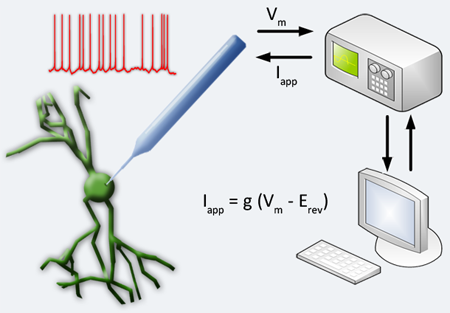Introducing RTXI
RTXI, the Real-Time eXperiment Interface, is a hard real-time data acquisition and control application for biological research. At its core is a Real-Time Operating System (RTOS), which uses a modified Linux kernel to provide deterministic control in a variety of experimental settings. RTXI is a fast, free, and open-source system currently used in labs all over the world to probe diverse, technologically challenging problems, such as dynamic probing of ion-channel function, control of cardiac arrhythmia dynamics, and control of deep-brain stimulation patterns.
Why real-time?
Experimentalists' ability to perturb biological systems has traditionally been limited to rigid pre-programmed protocols or more flexible, albeit reflex-constrained, operator-controlled protocols. In contrast, real-time control allows dynamic probing of biological systems by parameter perturbations calculated from instantaneous system measurements. With it, researchers can address diverse unanswered questions that are not amenable to traditional approaches.
Why RTXI?
Unfortunately, real-time control is not possible with standard operating systems and software. Furthermore, commercial real-time systems are costly and often designed for industrial applications, and the proprietary software licenses and drivers that come with them constrain their flexibility in experimental settings. To get away from that, we developed RTXI. It's fast, free, and flexible, and it's compatible with a wide range of experimentation hardware.

Latest Publications
Technical overview of RTXI
Ever been curious about how RTXI works? Check out the new paper recently published in PLOS Computational Biology:
RTXI Fall Newsletter
There have been lots of new developments in RTXI over the past few months. Look forward to the upcoming release of RTXI 2.1, and we encourage those of you attending SfN 2015 to check out our poster!



